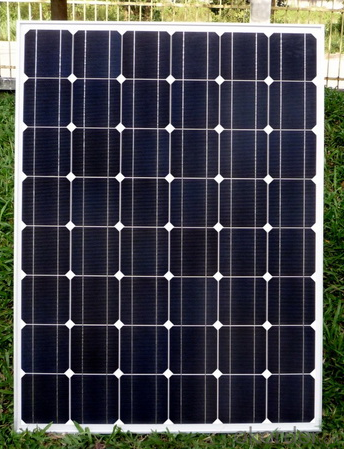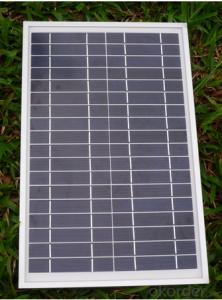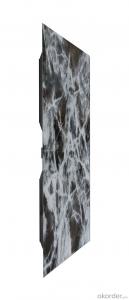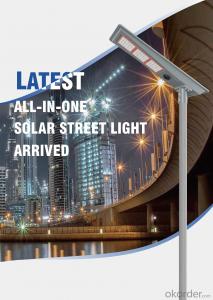300KW CNBM Monocrystalline Silicon Panel for Home Using
- Loading Port:
- Shekou
- Payment Terms:
- TT OR LC
- Min Order Qty:
- 100 watt
- Supply Capability:
- 1000 watt/month
OKorder Service Pledge
OKorder Financial Service
You Might Also Like
Item specifice
300KW CNBM Monocrystalline Silicon Panel for Home Using
Production description
Solar power is the conversion of sunlight into electricity, either directly using photovoltaics (PV), or indirectly using concentrated solar power (CSP). Concentrated solar power systems use lenses or mirrors and tracking systems to focus a large area of sunlight into a small beam. Photovoltaics convert light into anelectric current using the photovoltaic effect.[1]
Solar energy is radiant light and heat from the Sun harnessed using a range of ever-evolving technologies such assolar heating, photovoltaics, solar thermal energy, solar architecture and artificial photosynthesis.
It is an important source of renewable energy and its technologies are broadly characterized as either passive solar oractive solar depending on the way they capture and distribute solar energy or convert it into solar power. Active solar techniques include the use of photovoltaic systems,

Feature
1.High conversion efficiencies resulting in superior power output performance.
2.Outstanding power output even in low light or high temperature conditions
3.Optimized design for ease of soldering and lamination
Physical characteristic
1. Rigorous quality control meets the highest international standards.
2. High-transmissivity low-iron tempered glass, strong aluminium frame.
3. Using UV-resistant silicon.
4. IS09001/14001/CE/TUV/UL
packaging
26pcs in one carton 6pallets in 20foot container 14pallets in 40 foot container.
- Q:Can solar energy systems be used for powering off-grid eco-hospitals?
- Yes, solar energy systems can be used for powering off-grid eco-hospitals. Solar panels can be installed on the hospital's rooftop or surrounding areas to harness sunlight and convert it into electricity. This renewable energy source can power critical medical equipment, lighting, heating, cooling, and other essential systems in eco-hospitals, even in remote or off-grid locations. It offers a sustainable and cost-effective solution, reducing reliance on fossil fuels and minimizing the environmental impact of healthcare facilities.
- Q:Can solar energy systems be installed in areas with extreme temperatures?
- Yes, solar energy systems can be installed in areas with extreme temperatures. Solar panels are designed to withstand a wide range of temperatures, including both hot and cold climates. However, extreme temperatures can affect the efficiency and performance of the system, so proper design and insulation measures should be taken into consideration during installation to ensure optimal performance and longevity.
- Q:Can solar energy systems be used in powering hotels or resorts?
- Certainly, hotels and resorts can make use of solar energy systems to power their facilities. Solar power is a renewable and clean energy source that can effectively meet the energy requirements of these establishments. Hotels and resorts typically consume a substantial amount of energy for various purposes, such as lighting, heating, cooling, and running electrical appliances and equipment. To harness the abundant sunlight, hotels and resorts can opt to install solar panels on their rooftops or in open areas. This allows them to convert sunlight into electricity, which can then be used to power the entire facility. By doing so, these establishments reduce their dependence on traditional energy sources, resulting in a decreased carbon footprint. In addition to its environmental advantages, solar energy systems can offer financial benefits to hotels and resorts. By generating their own electricity, these establishments can significantly lower or eliminate their utility bills, leading to substantial cost savings in the long run. Furthermore, some countries provide incentives, grants, or tax credits for the implementation of solar power systems, making such installations economically viable. Moreover, the availability of solar energy is not limited to sunny days. With advancements in technology, solar panels can still generate electricity even during cloudy or overcast conditions. Furthermore, any excess energy produced during peak sunlight hours can be stored in batteries for later use, ensuring a steady power supply throughout the day and night. By adopting solar energy systems, hotels and resorts can demonstrate their commitment to sustainability and environmental responsibility. This can serve as a valuable marketing tool, attracting environmentally conscious guests who prefer eco-friendly accommodations. It also aligns with the growing trend of sustainable tourism, enhancing the reputation and competitiveness of these establishments in the industry. Overall, solar energy systems are a practical and efficient solution for powering hotels and resorts. They offer a multitude of benefits, including reduced utility costs, environmental sustainability, and increased market appeal. As technology continues to advance and become more affordable, more hotels and resorts are embracing solar power as a reliable and clean energy source.
- Q:Can solar panels be installed on different types of roofs?
- Yes, solar panels can be installed on different types of roofs, including pitched roofs, flat roofs, metal roofs, and concrete tile roofs. The specific installation method may vary depending on the roof type, but with proper design and mounting equipment, solar panels can be successfully installed on various roof surfaces.
- Q:What are the different applications of solar energy systems in transportation?
- Solar energy systems can be used in transportation for various applications, including powering electric vehicles, charging stations, and providing energy for auxiliary systems such as lighting and ventilation in vehicles. Solar panels can be integrated into the design of vehicles or installed on rooftops of cars, buses, and trains to harness solar energy and reduce dependence on fossil fuels. This renewable energy source can help mitigate greenhouse gas emissions, increase energy efficiency, and promote sustainable transportation.
- Q:Can solar energy systems be used in areas with frequent hurricanes?
- Yes, solar energy systems can be used in areas with frequent hurricanes. While it is true that hurricanes can cause damage to solar panels and other components of solar energy systems, there are measures that can be taken to mitigate these risks. Firstly, the design and installation of solar energy systems in hurricane-prone areas can be done to withstand high winds. This includes using stronger mounting systems, reinforced frames, and secure anchoring techniques. Additionally, the orientation and tilt angle of the panels can be optimized to minimize wind resistance. Furthermore, regular maintenance and inspections can help identify any potential issues or damage to the system before a hurricane hits. This allows for timely repairs or replacements, ensuring the system remains functional and safe during extreme weather events. In the event of a hurricane, it is important to have emergency procedures in place to secure the solar panels and other components. This can involve temporarily removing the panels and securing them indoors or utilizing protective covers to shield them from debris. Moreover, the use of microinverters or power optimizers in solar energy systems can enhance their resilience in hurricane-prone areas. These technologies allow each solar panel to operate independently, mitigating the impact of any damage to a single panel and preventing the entire system from shutting down. Lastly, solar energy systems can also contribute to the resilience of communities during and after hurricanes. With proper battery storage, solar systems can provide backup power during power outages, allowing essential services to continue operating and providing electricity for critical needs such as lighting, refrigeration, and medical equipment. Overall, while precautions need to be taken to ensure the durability and functionality of solar energy systems in hurricane-prone areas, they can be effectively used to harness clean and renewable energy even in the face of frequent hurricanes.
- Q:Can solar energy systems be used in powering research laboratories or scientific facilities?
- Yes, solar energy systems can be used to power research laboratories or scientific facilities. Solar panels can be installed on the roofs or grounds of these facilities to convert sunlight into electricity. This renewable energy source can provide a sustainable and reliable power supply, reducing dependence on traditional electricity grids and minimizing the carbon footprint of these facilities. Additionally, solar energy systems can be integrated with battery storage solutions to ensure continuous power supply even during periods of low sunlight or power outages.
- Q:Can solar energy systems be used in space exploration?
- Solar energy systems are indeed utilized in space exploration. In the demanding conditions of space, solar energy proves to be a dependable and renewable power source. Satellites and spacecraft commonly employ solar panels to generate electricity for their diverse systems and instruments by harnessing sunlight and converting it into electricity through the photovoltaic effect. One of the primary benefits of employing solar energy in space exploration lies in its abundance. The sun offers an essentially limitless energy source that can be accessed throughout the entire solar system. Consequently, solar power becomes an appealing option for lengthy missions where alternatives like batteries or fuel cells would be impractical. Moreover, solar energy systems possess the advantage of being lightweight and scalable, making them an ideal choice for space applications. This is vital due to the significant concern over weight during space missions, given the exorbitant cost of launching objects into space. Solar panels can be conveniently packed and deployed, presenting a compact and efficient solution for power generation. Furthermore, solar energy exhibits its superiority as a clean and sustainable power source. Unlike traditional fuel-based systems, solar energy does not emit harmful substances or generate waste, making it crucial for maintaining spacecraft cleanliness and minimizing environmental impact. However, it is important to acknowledge the limitations of solar energy systems in space. For missions beyond the Mars orbit, where sunlight is notably diminished, alternative power sources like nuclear energy or fuel cells may prove more suitable. Nonetheless, solar energy remains a vital and extensively employed technology in space exploration, playing a key role in powering scientific experiments, communication systems, and other essential functions.
- Q:Can solar energy systems be used in areas with limited access to food?
- Yes, solar energy systems can be used in areas with limited access to food. Solar energy systems provide a sustainable and reliable source of electricity, which can power various applications, including food production and processing. Solar-powered irrigation systems can be used to water crops, while solar-powered refrigeration can help preserve food. Additionally, solar energy can be utilized to power hydroponic or vertical farming systems, enabling food production in limited spaces. Therefore, solar energy systems can play a crucial role in addressing food scarcity and promoting food security in areas with limited access to food.
- Q:Can solar energy systems be used in areas with limited access to skilled labor?
- Yes, solar energy systems can be used in areas with limited access to skilled labor. Solar energy systems are designed to be simple and easy to install, requiring minimal technical expertise. With proper training and guidance, individuals with limited skills can learn to install and maintain solar panels. Additionally, advancements in technology have made solar systems more user-friendly, reducing the need for specialized knowledge. This makes solar energy a viable option for areas with limited access to skilled labor, providing clean and sustainable energy solutions.
1. Manufacturer Overview |
|
|---|---|
| Location | |
| Year Established | |
| Annual Output Value | |
| Main Markets | |
| Company Certifications | |
2. Manufacturer Certificates |
|
|---|---|
| a) Certification Name | |
| Range | |
| Reference | |
| Validity Period | |
3. Manufacturer Capability |
|
|---|---|
| a)Trade Capacity | |
| Nearest Port | |
| Export Percentage | |
| No.of Employees in Trade Department | |
| Language Spoken: | |
| b)Factory Information | |
| Factory Size: | |
| No. of Production Lines | |
| Contract Manufacturing | |
| Product Price Range | |
Send your message to us
300KW CNBM Monocrystalline Silicon Panel for Home Using
- Loading Port:
- Shekou
- Payment Terms:
- TT OR LC
- Min Order Qty:
- 100 watt
- Supply Capability:
- 1000 watt/month
OKorder Service Pledge
OKorder Financial Service
Similar products
New products
Hot products
Related keywords





























